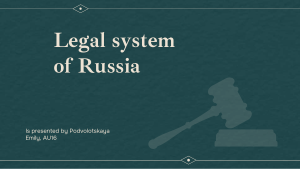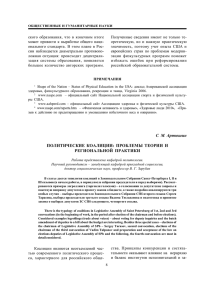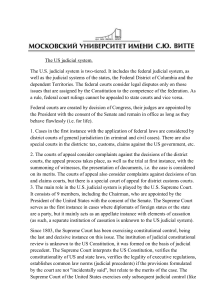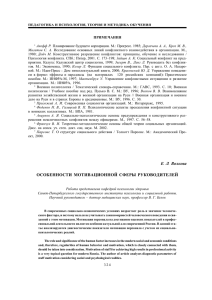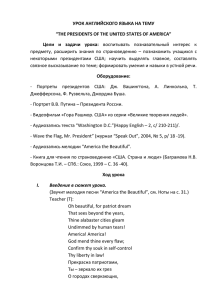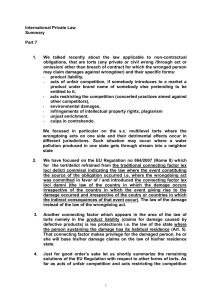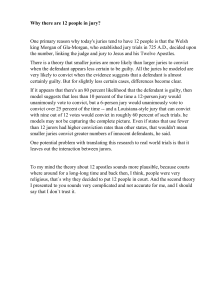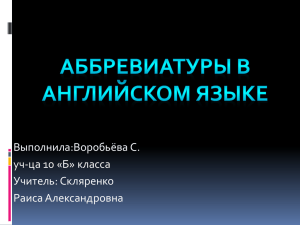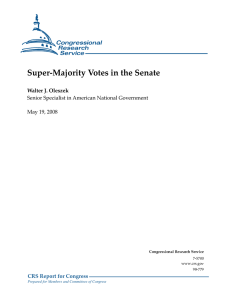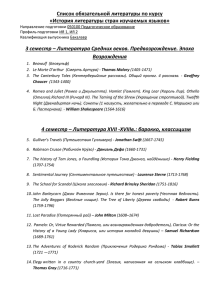Excutuve branch. Judiciary. Political parties and elections.
реклама
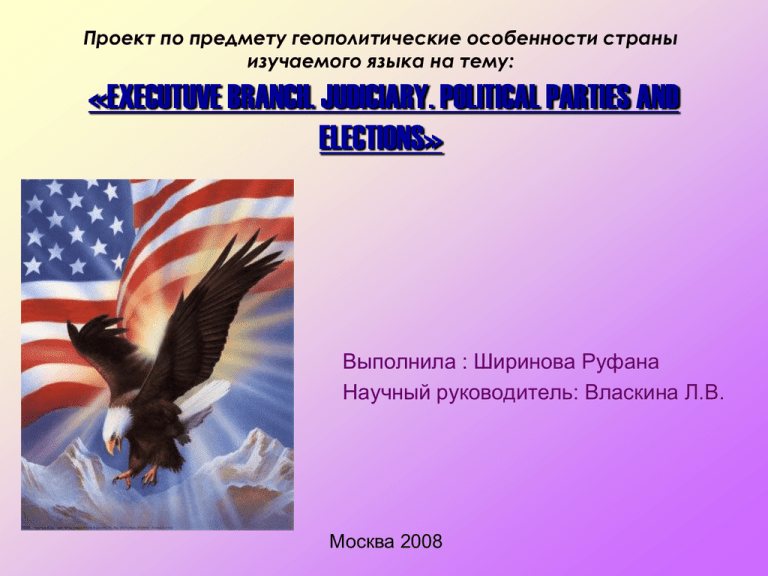
Проект по предмету геополитические особенности страны изучаемого языка на тему: «EXECUTUVE BRANCH. JUDICIARY. POLITICAL PARTIES AND ELECTIONS» Выполнила : Ширинова Руфана Научный руководитель: Власкина Л.В. Москва 2008 План проекта • 1. The Executive Branch: 1.1. the President 1.2. most famous Presidents 1.3. the Executive Office of the President • 2. The Judicial Branch 2.1. the Supreme Court 2.2. Courts of federal jurisdiction 2.3. Jury 2.3. Courts of state jurisdiction. • 3. Political Parties and Elections 3.1. The Democratic Party 3.2. The Republican Party 3.3. The Republican and Democratic Parties: policy, supporters. 3.4. Elections. Presidential Elections. 3.5. The main stages of presidential election campaign. Актуальность - поиск новых путей пополнения содержания изучения иностранного языка с целью его оптимизации в целом и подбор дополнительных материалов лингвострановедческого содержания для успешного формирования лингвосоциокультурной компетенции с целью приобщения учащихся к межкультурному взаимодействию на основе приобретенных знаний социокультурного характера. Цель исследования – адаптировать материал по теме «Политическая система США» для систематизации знаний и формирования вторичной языковой личности учеников изучающих углублено язык . Задачи: 1. изучить и проанализировать особенности политической системы США. 2. систематизировать реалии законодательной, исполнительной, судебной власти и Конституции США. 3. составление теста по теме «Политическая система США» Гипотеза - совершенствование лингвосоциокультурной компетенции углубленно развивает навыки и умения учеников. Методы:: 1. анализ научной и справочной литературы; 2. отбор; 3. анализ; 4. обобщение и систематизация фактической информации. Практическая значимость - возможностью использования составленного теста «Политическая система США» как аспекта страноведение по дисциплине «Геополитические особенности страны изучаемого языка». The Executive Branch The 2nd Article of the US Constitution describes Executive power, represented by the President. The President is: - the most important government figure; - the head of state; - the Chief Executive ; - Commander-in-Chief. Не has the right: John F. Kennedy (1917-1963), 35th President of the USA • to propose bills; • to negotiate & conclude international treaties, which arc then to be ratified by the Congress; • to appoint senior officials (government heads). These appointments must be then approved by the Senate. Topical vocabulary: the Chief Executive - глава исполнительной власти Commander-in-Chief - верховный главнокомандующий senior officials (government heads) - высшие должностные лица. The President: - commands the armed forces; - makes foreign policy; - as head of the executive branch he sees to it that the laws adopted by the Congress are carried out. He is also the leader of the political party from which he was elected. The President's term of office is 4 years. Presidential election is held every 4 years. According to the Constitution a president's office is limited to 2 terms (of 4 years each). He cannot be elected for more than 2 terms. The Constitution also describes how a president can be removed from office (impeachment procedure). 43 presidents were elected in American history. George Washington, 1st President of the USA Now the USA has its 43d president, George Bush, Junior (a Republican). A number of US presidents are greatly respected in the USA & abroad, & are considered to be prominent historic figures. They include: George Washington - the 1st president (1789-1797); Thomas Jefferson - the 3rd president the author of the Declaration of Independence (1801-1809); Theodore Roosevelt (1901-1909) (Rep.) - the 26th president, a Nobel peace prize winner Woodrow Wilson (Dem.) (1913-1921) - the 28th president, put forward the idea to create the League of Nations. A Nobel peace prize winner. Franklin Delano Roosevelt (1933-1945) (Dem.) - the 32nd president, suggested New Deal - a program of economic recovery, which helped to come out of the Great Depression of the 1930s. He is known as one of the founders of the antiHitler coalition during WWII. John Fitzgerald Kennedy (1961- 1963) (Dem.) - the 35th president the youngest US president (44 years of age), the only Catholic president. He is known for the program New Frontier, for the civil rights movement, for putting forward some social programs. Franklin D. Roosevelt, 32nd President Topical vocabulary: the program New Frontier — «Новые рубежи» The Presidents of the USA Topical vocabulary: The residence of the US president is White House in Washington, D.C., Pennsylvania Avenue, 1600. The name can also government, be used figuratively meaning the US American administration, the executive power. The Executive Office of the President исполнит.управление президента councils - советы the National Security Council - СНБ (Compare: the Capitol Hill, the Hill) the White House Office - аппарат Белого дома The Executive Office of the President helps him lo carry out his responsibilities. It consists of several offices & councils, including the National Security the National Aeronautics & Space Administration (NASA) Национальное управление по аэронавтике и исследованию космического пространства Council & the White House Office . The executive branch consists of 18 departments & over 40 independent agencies. Among them are: - the CIA - the National Aeronautics & Space Administration (NASA) - the Environmental Protection Agency & many others. the Environmental Protection Agency (EPA) - Агентство по охране окружающей среды Topical vocabulary: The department heads are called secretaries. (Except the Attorney General). 14 of them form the president's cabinet. It's not an official but only a traditional body in the US state system 1st introduced by G. civilians (civil servants) гражданский чиновник; лицо, состоящее на гражданской службе employees - госслужащие Washington. Since the cabinet is an unofficial body, presidents treated it differently in American history. The cabinet can play different roles: it can be a the federal bureaucracy федеральные чиновники decision-making body, working out general policy of the presidential administration or it can only play a consultative role as the president's adviser on his strategy. Some presidents practically ignored the cabinet (Woodrow Wilson, Theodore Roosevelt, F.D. Roosevelt). Almost 3 mln. civilians work in the departments & agencies of the executive branch. They are government employees who make up the federal bureaucracy . 10 % of these federal employees work in Washington, DC, 6 % work outside the USA, the rest are located throughout the 50 states. The chief executive in a state is the governor. California Governor Arnold Schwarzenegger Topical vocabulary: The Judicial Branch Article 3 of the Constitution describes the judicial branch, which reviews - пересматривать rule - постановлять, решать- юр. is represented by: - the Supreme Court; judicial review - судебное ограничение, судебный надзор. - Courts of federal jurisdiction; - Courts of state jurisdiction. The Supreme Court is: • the highest court in the nation; • composed of 9 judges, who are called justices (they are appointed for life by the president with Senate approval); • the highest court of appeal; • interprets the laws and reviews them to determine whether they conform to the US Constitution. If the majority of justices rule that the law in question violates the Constitution, the law is declared unconstitutional and becomes invalid. This process is known as judicial review. All lower courts follow the rulings of the Supreme Court. Rulings - постановления, решения суда Besides the Supreme Court there are different district courts and courts of appeal. Federal courts are created by Congress. They deal with serious criminal & civil cases. Criminal cases under federal jurisdiction include: - treason - destruction of government property - counterfeiting - hijacking - narcotic violations. Civil cases deal with violations of other people's rights, such as: - damaging property Topical vocabulary: treason – государственная измена counterfeiting ['kauntefit] подделка, фальшивые деньги, подложный документ - violating a contract - libel. If found guilty in a civil case a person may be required to pay a certain amount of money called damages, but he is never sent to prison. On the other hand, if found guilty in a criminal case, a convicted criminal may be imprisoned. The lowest federal court is the district court. 91 district courts operate around the country. Each state has at least one district court, some states have up to 4 district courts. District court judges are appointed for life. District courts are the only courts where the jury system is used. hijacking - угон самолета, судна damaging property причинять ущерб, убыток, повреждать libel [laibel] - клевета, диффамация damages - возмещение убытков Topical vocabulary: The US Constitution & the Bill of Rights guarantee the participation of the jury in all criminal cases. A jury is a group of citizens - usually 12 or 6 persons — who are chosen the jury - коллегия присяжных, суд присяжных, присяжные randomly - наугад randomly from people who live in the community. They make the decision on a case, which is called a verdict: all 12 or 6 to be appealed - быть обжалованным jury members must agree on the guilt or innocence of the accused. The decision of a district court may be appealed in the court of appeal. proper legal procedures судопроизводство There are 12 courts of appeal in the USA. The court of appeal studies the case & decides if proper legal procedures were observed or not. This court doesn't decide if the person is guilty or not. State courts (courts of state jurisdiction) handle criminal & other cases that do not come under federal jurisdiction. Most state judges are elected for limited terms. Political Parties and Elections There is a two-party system in the country, which many believe to be very important for the proper functioning Topical vocabulary: strongholds - опора of a democratic society. There are two major political parties in the USA: the Democratic & the Republican. The Democratic Party is the older of the two. It traces its history back to the 1820s. Historically it was the party, which supported slavery then. The main supporters of the D. Party are small businesses. Traditionally the Democratic strongholds are: - the state of New York, - the South - the trade unions. The party's symbol is the Donkey . the Donkey - демократический осел The Republican party was organized in the 1850s primarily as an antislavery party. The main supporters of the R. are big businesses. It has a nickname the Grand Old Party (GOP) (Великан старая партия) Its symbol is the Elephant. Nowadays the difference in political views & programs of the two parties is very vague (unclear). Over the years their positions have been changing & adapting themselves to the currently important Topical vocabulary: problems of public policy. There is very little difference between their programs. the Grand Old Party (GOP) - Великая старая партия 2 parties greatly resemble each other. Reasons: 1. The parties are organized locally by states or counties. 2. So on a national basis each political party is a loose association of many local party organizations. Each party is more interested in winning elections than in putting forward a particular policy or law. Each party is not a single party, but a collection of 50 parties, which are temporarily drawn together every 4 years for the purpose of winning the presidency. What makes the parties different is their position on different questions of national policy. In one of the last election campaigns, for example, the Democrats proposed to raise taxes on rich people, while the Republicans proposed to raise them on the middle class; the Republicans wanted to give more power to the states, while the Democrats were against it. There is a growing tendency among people to split their vote, to vote on a so-called split ticket, i.e. they stand for some of the positions of the Republican platform & for some of the Topical vocabulary: to split their vote - голосовать одновременно за кандидатов разных партий positions of the Democrats and they choose Democrats for some offices & Republicans for some other offices. The number of those who vote the straight ticket, is decreasing. Political parties in the USA are absolutely free of the party discipline that characterizes political parties in Europe & Asia. People who call themselves Democrats, Republicans or Independents do not make an application to join the party, they do not pay membership dues, do not attend meetings, do not have cards, as in other countries. Party membership is only shown in the way, the person votes, which party he votes for in the elections. In determining party membership such factors are often important as the personal qualities of a candidate, family traditions or historical reasons. a split ticket - избирательный бюллетень, в кот. внесены кандидаты двух и более разных партий to vote the straight ticket - голосовать за кандидатов одной партии Elections are held in the USA to elect: 1. the President & the Vice President 2. the Senate 3. the House of Representatives 4. governors 5. state legislatures. Presidential elections Topical vocabulary: Primaries - предварительные выборы, праймериз National Conventions - съезд политической партии для выдвижения кандидата на выборы electors - выборщики Presidential elections are held every 4 years (each leap year). The main stages of presidential election campaign are: 1. Primaries. (February through June). 2. National Conventions (in July or August). 3. Election of the electors takes place in November (on the 1st Tuesday after the 1st Monday in November) 4. Election of the president by the electoral college (on the 1st Monday after the 2nd Wednesday in December) 5. A joint session of the Congress to open the ballots (On the 6th of January). 6. Inauguration of the President (On the 20th of January). the electoral college - коллегия выборщиков inauguration [I"nLgjə'reiʃ(ə)n] официальная церемония вступления в должность высшего должностного лица 1) Primaries are preliminary elections which are held only in one-third of the states. The first state to hold them is New Hampshire, then the other states, which have primaries follow one by one. Primaries are held to find out which of the prospective candidates of the party enjoys greatest popularity. In some states delegates for national conventions are also elected in the primaries. US Primaries’ 08: Obama wins in 13 states 2) National Conventions of parties are held in July or August. 3) The main target of the convention is to choose (nominate) a candidate for the presidency and vicepresidency. Delegates first approve their party platform (statements of party positions on foreign policy, employment, education, civil rights, etc.). The presidential candidate is expected to support the platform in his campaign. Then the National convention nominates a candidate for the presidency and vice-presidency. The president and the vice-president run and must be voted for as a team. Presidential campaigns continue until early November. Republican National Convention They are very expensive. The tremendous campaign costs are financed by federal funds with equal amounts of money for each major party. Besides, the competing candidates also receive private contributions 3) Election of Electors takes place in early November. Electors are chosen by popular vote in each state. (The number of electors in a state is equal to the number of the states representatives in Congress, so the number of senators & congressmen from the state is equal). Electors are representatives of each state party. They are supposed to vote for the candidate who has won the majority of votes in that state. Inauguration of George W. Bush 4) Election of the President by the electoral college. In December electors vote in their states, traditionally they support their party candidates. The results of voting are sent to the Senate in Washington. 5) A joint session of the Congress opens the ballots and approves the results on Jan. 6. 6) Inauguration of the President takes place on January 20. Inauguration of Bill Clinton This system of elections can give a majority of Electoral College votes to a Presidential candidate who doesn't have a majority in the national popular vote. This happened several times in US history: - in 1960 John Kennedy (Dem.) received only 49.7 % of the popular vote & over 56 % of the Electoral College votes. - The same thing happened in 1968 when R. Nixon (Rep.) was elected President - and in 1976 when James Carter (Dem.) was elected. Richard Nixon In recent years there has been discussion about eliminating the Electoral College procedure. Many people think it is awkward & undemocratic, they favour the direct election of the president & vicepresident. Others believe that in case of a close popular vote the Electoral College votes clearly establishes the winner. James Carter Библиография 1. Бурлак А.И., Бурлак Дж.Г., Кравцова Л.И. Focus on America. Знакомство с Америкой. М.: Астрель. АСТ, 2002. 2. Костина Е. About the United States of America. О Соединенных штатах Америки. М.: Московский лицей, 2001. 3. Нестерчук Г.В., Иванова В.М. США и американцы. Минск: Вышэйшая школа, 2004. 4. Ощепкова В.В. USA in Brief. О США кратко. М.: Иностранный язык, Оникс, 2002. 5. Токарева Н.Д., Шепард В. Америка. Какая она? (What it is like in the USA). М.: Высшая школа, 2000. 6. Томахин Г.Д. США: Лингвострановедческий словарь. М.: Русский язык, 2000. 7. Americana. Американа. Англо-русский лингвострановедческий словарь. Под ред. проф. Г.В. Чернова. Смоленск: Полиграмма, 1996. 8. Profiles of the United States. Рассказы об Америке. Под ред. проф. Афанасьевой. М.: Астрель, 2001. Приложение Test 1. ___ Presidents were elected in American history. a) 50 b) 34 c) 43 2. Executive power is represented by _______ . a) the Supreme Court b) the governor c) the President d) The senior official 3. a) b) c) The President has the right: _________________________________________ _________________________________________ _________________________________________ 4. Senior officials can’t be appointed without _________ approval. a) the Supreme Court b) The Senate c) the Congress 5. The President term of office is __ years. a) 3 b) 5 c) 4 6. The President can be elected for more than 3 terms. a) true b) false 7. Nowadays The USA president is _________________ . 8. The residence of the US President is ______________ a) The Westminster Palace b) The White House c) the Pentagon 9. The executive power consists of __ departments…. a) 16 b) 15 c) 18 …….and among them are: a) ____________________________________________________ b) ____________________________________________________ c) ____________________________________________________ 10. a) 14 b) 21 c) 11 The department heads are called secretaries. _______of them form the President's cabinet. 11. a) b) c) The Judicial Branch is represented by: ________________________________________ ________________________________________ ________________________________________ 12. The Supreme Court is composed of __ judges. a) 10 b) 5 c) 9 13. Federal courts are created by ________. a) Congress b) The Supreme Court c) the President 14. a) b) c) d) e) Federal courts deal with serious criminal & civil cases. Criminal cases under federal jurisdiction include: ___________________________________________ ___________________________________________ ___________________________________________ ___________________________________________ ___________________________________________ 15. Civil cases deal with violations of other people's rights, such as: : a) b) c) ___________________________________________ ___________________________________________ ___________________________________________ 16. The lowest federal courts are the district courts. ___ district courts operate around the country. a) 90 b) 91 c) 87 17. District court judges are appointed ___________. a) for life b) for 4 years c) for a term 18. The jury (number of persons/ the way they are chosen/ cases they take a part in) : ____________________________________________________ ____________________________________________________ ____________________________________________________ ____________________________________________________ ____________________________________________________ 19. The jury makes the decision on a case, which is called a _________. 20. The decision of a district court may be appealed in the court of appeal. There are __ courts of appeal in the USA. a) 11 b) 12 c) 18 21. There are two major political parties in the USA: a) the Democratic & the Republican; b) the Republican and the Liberal; c) the Communist and the Socialist; d) the Democratic and the Communist. 22. There is a … system in the country: a) one-party; b) multi-party; c) two-party; d) non-party. 23. Historically the Democratic Party supported: a) freedom; b) slavery; c) communism; d) economic development. 24. The Democratic Party's symbol is … . 25. The main supporters of the Republican Party are: a) farmers; b) big businesses; c) small businesses; d) the state of New York. 26. The Republican Party’s nickname is: a) White Elephant; b) the Grand Old Party; c) the Evil One; d) the Great Old Party. 27. Each party is more interested in: a) winning elections; b) putting forward a particular policy or law; c) improving the lives of the people; d) speaking as much as possible. 28. Traditionally the Democratic strongholds are (several variants are possisble): a) b) c) d) e) f) g) h) the state of New York; the North; the South; the state of New Jersey; the Midwestern states; the trade unions; The state of California; the South-East. 29. The term “to split one’s vote” means: a) to vote on a split ticket; b) to refuse to vote; c) to vote only for one party; d) to wreck the voting. 30. In determining party membership such factors are often important as (several variants are possible): a) b) c) d) e) the name of a candidate; the personal qualities of a candidate; family traditions or historical reasons; the social position; -good education. 31. Elections are held in the USA to elect (several variants are possible): a) b) c) d) e) f) g) h) the President & the Vice President; the King; the Queen; the Senate; the House of Representatives; governors; state legislatures; the Tsar. 32. Election of the electors takes place in: a) June; b) May; c) November; d) January. 33. Inauguration of the President takes place: a) on the 20th of January; b) on the 15th of January; c) on the 5th of October; d) on the 9th of May. 34. The correct order of the main stages of presidential election campaign is: Primaries; National Conventions; Inauguration of the President ; Election of the electors takes place in November; A joint session of the Congress to open the ballots; Election of the president by the electoral college; 1. 2. 3. 4. 5. 6. 35. Primaries are … elections which are held only in one-third of the states. 36. The main target of the National Convention is: a) to celebrate some holiday; b) to nominate a candidate for the presidency and vice-presidency; c) to depose a president; d) to nominate governors. 37. On the picture there is the inauguration of …: a) Bill Clinton; b) Reagan Ronald; c) George W. Bush; d) John F. Kennedy. 38. The president and the vice-president run and must be voted for as: a) a team; b) separate units. 39. After the election of the President by the electoral college the results of voting are sent to: a) the home state of a candidate; b) hell; c) the Senate in Washington; d) to the incumbent president. 40. Political parties in the USA are absolutely … of the party discipline. Keys 1) c 2)c 3 ) to propose bills; to negotiate & conclude international treaties; to appoint senior officials 4)b 5)c 6) b 7 ) George W. Bush 8)b 9 ) c; the CIA, the NASA, EPA 10 ) a 11 ) The Supreme Court; Courts of federal jurisdiction; Courts of state jurisdiction 12) c 13) a 14) treason ; destruction of government property; counterfeiting; hijacking ; narcotic violations. 15) damaging property; violating a contract; libel 16) b 17) a 18) The US Constitution & the Bill of Rights guarantee the participation of the jury in all criminal cases. A jury is a group of citizens - usually 12 or 6 persons — who are chosen randomly from people who live in the community. They make the decision on a case, which is called a verdict: all 12 or 6 jury members must agree on the guilt or innocence of the accused. 19) verdict 20) b 21) a 22 ) c 23 ) b 24 ) the Donkey 25 ) b 26) b 27 ) a 28 ) a, c, f 29 ) a 30 ) b, c 31 ) a, d, e, f, g 32) c 33) a 34) 1. Primaries; 2. National Conventions; 3. Election of the electors takes place in November; 4. Election of the president by the electoral college; 5. A joint session of the Congress to open the ballots; 6. Inauguration of the President. 35) preliminary 36) b 37) c 38) a 39) c 40) free

